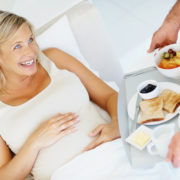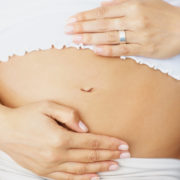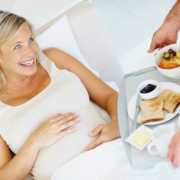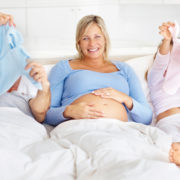Which vitamins are important during preconception, pregnancy and lactation?
This helps with hair loss during pregnancy
During pregnancy, most women have a full head of strong hair.
However, this changes a few weeks after the birth of the child: normally, everyone loses up to a hundred hairs a day.
But now more hair is visibly falling out, and in extreme cases the first thinning patches can soon be seen on the scalp.

The reason for this is the oestrogen level.
The hormone oestrogen ensures this during pregnancy, that the hair follicles remain in the growth phase.
The hair ‘lives’ and therefore grows longer.
After giving birth, the oestrogen level drops again so that many of the hair follicles switch from the growth phase to the resting phase.
As a result, the hair stops growing and eventually falls out.
Hair loss after pregnancy is therefore normal.
Only if more than a hundred hairs fall out every day for several weeks and light patches form on the scalp could the cause be something else.
For example, excessive hair loss combined with tiredness and pale skin may be due to iron deficiency, a thyroid disorder or a skin disease.
If in doubt, a doctor should investigate. Fortunately, however, oestrogen levels and therefore the hair life cycle normalize in most women after six months at the latest.
It rarely takes up to a year for hair loss to subside again after pregnancy.
This can help to minimize hair loss after pregnancy
- Allow your body to rest as often as possible so that you can recover from the strain of childbirth, the stress and lack of sleep during the first few weeks with the baby.
Consciously eat a healthy and balanced diet during this time. - Use shampoos that are gentle on your hair and scalp; do not blow-dry your hair too hot.
A scalp massage every now and then stimulates the blood flow to your scalp. - Wear longer hair loose, as a plait or ponytail would put mechanical strain on the hair and also encourage it to fall out.
- A clever cut can make the hair appear fuller, cover thinning areas and thus bridge the time until the old fullness returns.
- Eat a particularly healthy diet.
Your vitamin requirements are greatly increased during pregnancy and breastfeeding.
More pasta, bread and chocolate won’t help, on the contrary.
You only need about 25% more energy, but often 100% more vitamins and trace elements.
A dietary supplement such as amitamin® fertil F with biotin, selenium, iron and copper and other micronutrients can help you to efficiently support your vitamin intake!
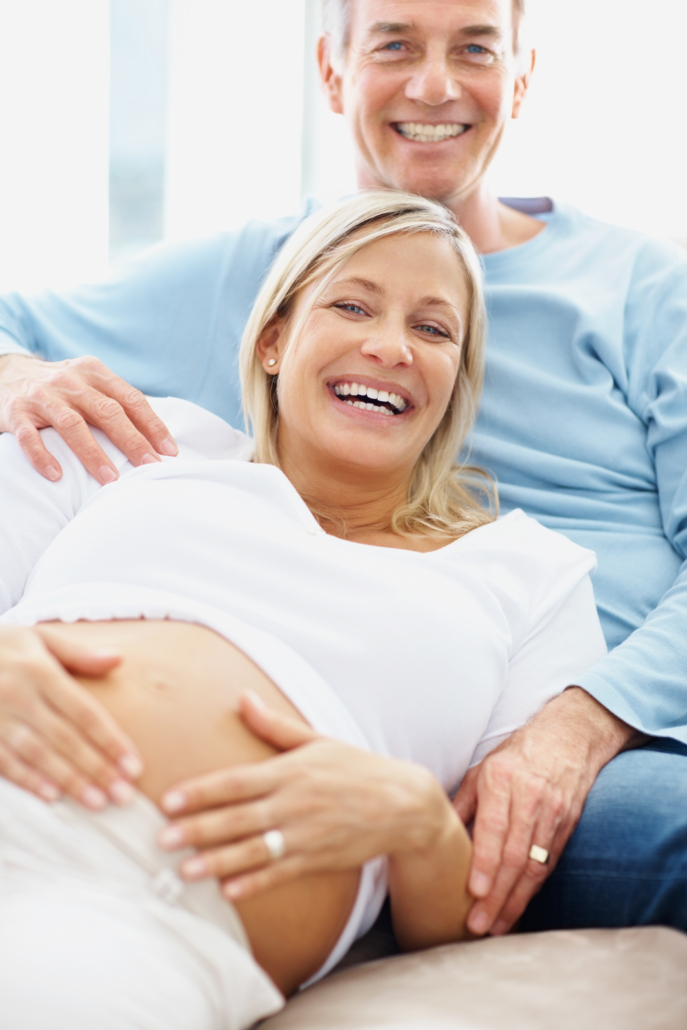
More about a healthy pregnancy and vitamins and trace elements:
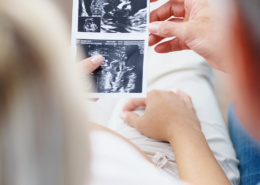 https://fertil-f.com/wp-content/uploads/2019/01/PCOS-Inositol-treatment-ID37295.jpg
5616
3744
Michael Dr. Prang
https://fertil-f.com/wp-content/uploads/2018/02/fertil-f-logo.png
Michael Dr. Prang2024-08-30 12:33:032024-08-30 12:33:11What happens in the first three months of pregnancy
https://fertil-f.com/wp-content/uploads/2019/01/PCOS-Inositol-treatment-ID37295.jpg
5616
3744
Michael Dr. Prang
https://fertil-f.com/wp-content/uploads/2018/02/fertil-f-logo.png
Michael Dr. Prang2024-08-30 12:33:032024-08-30 12:33:11What happens in the first three months of pregnancy https://fertil-f.com/wp-content/uploads/2019/01/PCOS-Inositol-treatment-ID37297.jpg
3744
5616
Michael Dr. Prang
https://fertil-f.com/wp-content/uploads/2018/02/fertil-f-logo.png
Michael Dr. Prang2024-08-30 12:32:532024-08-30 12:32:59Travel and sport: how much should you take it easy during pregnancy?
https://fertil-f.com/wp-content/uploads/2019/01/PCOS-Inositol-treatment-ID37297.jpg
3744
5616
Michael Dr. Prang
https://fertil-f.com/wp-content/uploads/2018/02/fertil-f-logo.png
Michael Dr. Prang2024-08-30 12:32:532024-08-30 12:32:59Travel and sport: how much should you take it easy during pregnancy?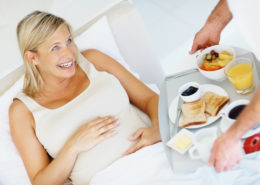 https://fertil-f.com/wp-content/uploads/2018/02/ernaehrung-waehrend-der-schwangerschaft.jpg
3292
4938
Michael Dr. Prang
https://fertil-f.com/wp-content/uploads/2018/02/fertil-f-logo.png
Michael Dr. Prang2024-08-30 12:32:382024-08-30 12:32:49The right diet before and during pregnancy
https://fertil-f.com/wp-content/uploads/2018/02/ernaehrung-waehrend-der-schwangerschaft.jpg
3292
4938
Michael Dr. Prang
https://fertil-f.com/wp-content/uploads/2018/02/fertil-f-logo.png
Michael Dr. Prang2024-08-30 12:32:382024-08-30 12:32:49The right diet before and during pregnancy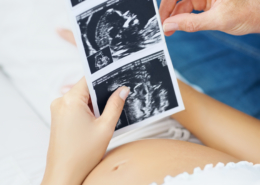 https://fertil-f.com/wp-content/uploads/2019/01/PCOS-Inositol-treatment-ID37296.jpg
5616
3744
Michael Dr. Prang
https://fertil-f.com/wp-content/uploads/2018/02/fertil-f-logo.png
Michael Dr. Prang2024-08-30 12:32:232024-08-30 12:32:33These are the natural signs of pregnancy
https://fertil-f.com/wp-content/uploads/2019/01/PCOS-Inositol-treatment-ID37296.jpg
5616
3744
Michael Dr. Prang
https://fertil-f.com/wp-content/uploads/2018/02/fertil-f-logo.png
Michael Dr. Prang2024-08-30 12:32:232024-08-30 12:32:33These are the natural signs of pregnancy
Detailed comparison: the alternatives femibion®, Elevit®, Orthomol Natal® & amitamin® fertil F
Pregnancy tips, trace elements, vitamins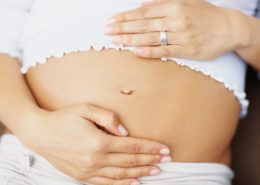 https://fertil-f.com/wp-content/uploads/2018/02/multivitamine-wahrend-der-schwangerschaft.jpg
3744
5616
fertilf
https://fertil-f.com/wp-content/uploads/2018/02/fertil-f-logo.png
fertilf2024-08-30 12:31:462024-08-30 12:31:51What is Quatrefolic®?
https://fertil-f.com/wp-content/uploads/2018/02/multivitamine-wahrend-der-schwangerschaft.jpg
3744
5616
fertilf
https://fertil-f.com/wp-content/uploads/2018/02/fertil-f-logo.png
fertilf2024-08-30 12:31:462024-08-30 12:31:51What is Quatrefolic®? https://fertil-f.com/wp-content/uploads/2018/02/food-supplement-pregnancy.jpg
630
827
fertilf
https://fertil-f.com/wp-content/uploads/2018/02/fertil-f-logo.png
fertilf2024-08-30 12:31:372024-08-30 12:31:43Nutritional supplements during pregnancy – useful or not?
https://fertil-f.com/wp-content/uploads/2018/02/food-supplement-pregnancy.jpg
630
827
fertilf
https://fertil-f.com/wp-content/uploads/2018/02/fertil-f-logo.png
fertilf2024-08-30 12:31:372024-08-30 12:31:43Nutritional supplements during pregnancy – useful or not?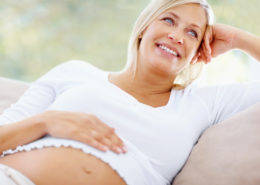 https://fertil-f.com/wp-content/uploads/2018/02/amitamin-fertil-f-phase-1-phase-2.jpg
3744
5616
fertilf
https://fertil-f.com/wp-content/uploads/2018/02/fertil-f-logo.png
fertilf2024-08-30 12:31:302024-08-30 12:31:33Iodine requirement during pregnancy
https://fertil-f.com/wp-content/uploads/2018/02/amitamin-fertil-f-phase-1-phase-2.jpg
3744
5616
fertilf
https://fertil-f.com/wp-content/uploads/2018/02/fertil-f-logo.png
fertilf2024-08-30 12:31:302024-08-30 12:31:33Iodine requirement during pregnancy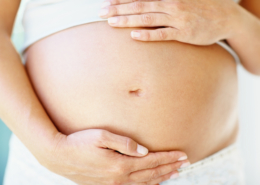 https://fertil-f.com/wp-content/uploads/2019/01/PCOS-Inositol-treatment-ID37343.jpg
3744
5616
Michael Dr. Prang
https://fertil-f.com/wp-content/uploads/2018/02/fertil-f-logo.png
Michael Dr. Prang2024-08-30 12:29:202024-08-30 12:29:27How to lose weight again after pregnancy
https://fertil-f.com/wp-content/uploads/2019/01/PCOS-Inositol-treatment-ID37343.jpg
3744
5616
Michael Dr. Prang
https://fertil-f.com/wp-content/uploads/2018/02/fertil-f-logo.png
Michael Dr. Prang2024-08-30 12:29:202024-08-30 12:29:27How to lose weight again after pregnancy https://fertil-f.com/wp-content/uploads/2019/01/PCOS-Inositol-treatment-ID37315.jpg
3744
5616
Michael Dr. Prang
https://fertil-f.com/wp-content/uploads/2018/02/fertil-f-logo.png
Michael Dr. Prang2024-08-30 12:29:032024-08-30 12:29:11This helps with hair loss during pregnancy
https://fertil-f.com/wp-content/uploads/2019/01/PCOS-Inositol-treatment-ID37315.jpg
3744
5616
Michael Dr. Prang
https://fertil-f.com/wp-content/uploads/2018/02/fertil-f-logo.png
Michael Dr. Prang2024-08-30 12:29:032024-08-30 12:29:11This helps with hair loss during pregnancy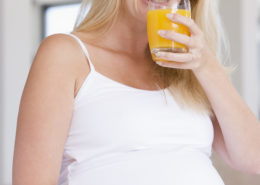 https://fertil-f.com/wp-content/uploads/2018/02/schwanger-werden-folat.jpg
4992
3328
Michael Dr. Prang
https://fertil-f.com/wp-content/uploads/2018/02/fertil-f-logo.png
Michael Dr. Prang2024-08-30 12:28:492024-08-30 12:28:59These foods contain particularly high levels of iron
https://fertil-f.com/wp-content/uploads/2018/02/schwanger-werden-folat.jpg
4992
3328
Michael Dr. Prang
https://fertil-f.com/wp-content/uploads/2018/02/fertil-f-logo.png
Michael Dr. Prang2024-08-30 12:28:492024-08-30 12:28:59These foods contain particularly high levels of iron https://fertil-f.com/wp-content/uploads/2019/01/PCOS-Inositol-treatment-ID37228.jpg
4242
3831
Michael Dr. Prang
https://fertil-f.com/wp-content/uploads/2018/02/fertil-f-logo.png
Michael Dr. Prang2024-08-30 12:28:382024-08-30 12:28:44Important for pregnant women: these foods contain particularly high levels of iodine
https://fertil-f.com/wp-content/uploads/2019/01/PCOS-Inositol-treatment-ID37228.jpg
4242
3831
Michael Dr. Prang
https://fertil-f.com/wp-content/uploads/2018/02/fertil-f-logo.png
Michael Dr. Prang2024-08-30 12:28:382024-08-30 12:28:44Important for pregnant women: these foods contain particularly high levels of iodineOther Products
Privatsphäre
about amitamin® fertil F
amitamin® fertil F phase contains the right amount of vitamins and trace elements for the second and third trimester of pregnancy. It also includes important omega-3 fatty acids DHA and EPA for brain and ee development of the unborn child. With bioactive folate Quatrefolic®: the perfect nutritional supplement for a healthy mother and baby durcing pregnancy and lactation.
about amitamin®
amitamin® is the expert for nutraceuticals from Germany. Top line formulas with study proven ingredients, Made in Germany. Developed with a no compromises approach: we are only satisfied when we can provide the best possible formula in the respective area. Many independent health specialists confirm: amitamin® provides the best products with the highest possible nutraceutical efficacy
amitamin® is a registered brand of Active Bio Life Science GmbH, 12529 Schönefeld, Germany
Quatrefolic® ist a registered trademark of Gnosis SpA, Italy.

